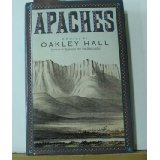 I’ve written a fair amount of commentary on Oakley Hall, his work and his life. If there was ever an undersung man of influence—as a writer, teacher, or human being—Oakley Hall’s life of letters is it.
I’ve written a fair amount of commentary on Oakley Hall, his work and his life. If there was ever an undersung man of influence—as a writer, teacher, or human being—Oakley Hall’s life of letters is it.
Here we are in the third of his trilogy of western legends (
Warlock the first, The Badlands the second—haven’t gotten to that one yet–And this one which he calls Apaches.
it’s a rather strange title at first consideration because those who know anything about the Lincoln County, New Mexico, conflict of the 1878’s think of them as cattle wars, not Indian wars. They’re the battles that gave us Pat Garrett and Billy the Kid. No one, I believe, automatically connects them to Native Americans.
Howevver … one of the most memorable remarks I ever heard from Hall came as an answer when someone asked him when he was going to write his next Ambrose Bierce detective novel.) “As soon as something pisses me off enough.” Hence, I believe, the treatment of the Indians by both Americans and Mexicans and by all of them of one another gave rise to his Madison County as a stand-in for Lincoln County, Jack Grant for Pat Garrett, and Johnny Angel for Billy the Kid. Not that either of he above characters bears much resemblance to his historical counterpart. William Bonnie was homely. Pat Garrett was (at least by legend) of unblemished integrity. Plus, they’re not even the main characters.
Instead, we have Lt. Patrick Cutler, a military renegade with a talent for nettling—no, enraging–his superior officers. He’d rather spend time with his scouts—Apaches employed by the army to track and fight their brethren. He’d rather rescue a “nigger” than pull out the body of a dead colleague. And, worst of all military sins, he cares not about advancement.
He also keeps company with townspeople—one lady of dubious reputation in particular. Maybe the fact that he was raised in a San Francisco whorehouse and thereby became fluent in Spanish has influenced his behavior and attitudes.
Point is, amid his various extra curricular acitivites he is charged with keeping a certain warrior named Caballito on the reservation so he doesn’t flee into Mexico, which involves making sure his people aren’t shorted on their rations, which involves stepping into the middle of an elaborate payoff scheme wherein the town store sells supplies to the reservation, the Indian agent distributes only a certain portion, then returns them to the store (for a kickback of course) then the merchant sells them back. Then hungry-for-promotion officers who want to promote a new Mexican war so they can get more stripes and bars are aggravated because it would be better for them if Caballito did escape, giving them an excuse to pursue him and spark a new international incident. Simple cattle war? You see why Oakley was pissed.

Johnny Angell, unlike William Bonny, fights on the side of the angels and fails. In one authentic touch, Hall has him utter Billy the Kid’s famous last words “Quien es” just before the sherrif plugs him. Unlike history, though, it doesn’t end there. Read it to find out.
Our officer Cutler, in the meantime, marries the granddaughtr of a Mexican Grendee with the promise of becming a rich hacendado if he produces a son. He does, and I guess he does become one of those. After failing in nearly every other endeavor he undertakes, though not under entirely happy circumstances.
We look here into the old west and its noble image and find in it the most rotten possible human behavior and motive. There are glimmers of goodness, but even they are tarnished. And yet, this is not by any means a pessimistic book. In ffact, I found it quite uplifting. You explain it.
